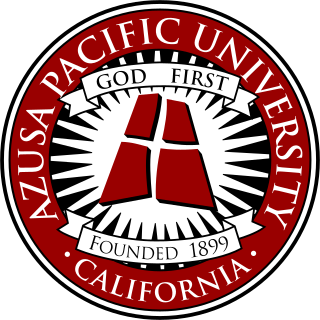
A community college is a type of educational institution. The term can have different meanings in different countries: many community colleges have an "open enrollment" for students who have graduated from high school. The term usually refers to a higher educational institution that provides workforce education and college transfer academic programs. Some institutions maintain athletic teams and dormitories similar to their university counterparts.

St. John Fisher University is a private liberal arts college in Pittsford, New York. It is named after John Fisher, an English Catholic cardinal and saint. It was named St. John Fisher College until July 1, 2022.
The Doctor of Education is a research or professional doctoral degree that focuses on the field of education. It prepares the holder for academic, research, administrative, clinical, or professional positions in educational, civil, private organizations, or public institutions.

Azusa Pacific University (APU) is a private, evangelical Christian university in Azusa, California. The university was founded in 1899, with classes opening on March 3, 1900, in Whittier, California, and began offering degrees in 1939. The university's seminary, the Graduate School of Theology, holds to a Wesleyan-Arminian doctrinal theology. APU offers more than 100 associate, bachelor's, master's, and doctoral programs on campus, online, and at seven regional locations across Southern California.
The Higher Education Funding Council for England (HEFCE) was a non-departmental public body in the United Kingdom, which was responsible for the distribution of funding for higher education to universities and further education colleges in England since 1992. It ceased to exist as of 1 April 2018, when its duties were divided between the newly created Office for Students and Research England.

Dallas Baptist University (DBU) is a Christian liberal arts university in Dallas, Texas. Founded in 1898 as Decatur Baptist College, Dallas Baptist University currently operates campuses in Dallas, Plano, and Hurst.

Student affairs, student support, or student services is the department or division of services and support for student success at institutions of higher education to enhance student growth and development. People who work in this field are known as student affairs practitioners or student affairs professionals. These student affairs practitioners work to provide services and support for students and drive student learning outside of the classroom at institutions of higher education.
Cabrini University is a private Roman Catholic university in Radnor Township, Pennsylvania. The college was founded by the Missionary Sisters of the Sacred Heart of Jesus in 1957, and was named after the first American naturalized citizen saint, Mother Frances Cabrini. It was one of the first universities in the United States to make community service a graduation requirement for all undergraduates; it now has a core curriculum centered on social justice which includes their signature classes, Engagements in the Common Good, also known as ECG.
John F. Kennedy University was an American nonprofit private university based in California with offices in Pleasant Hill, San Jose in California; Natick, Massachusetts; and Willemstad, Curaçao. The university was founded in 1965 to offer degrees and certificates for non-traditional higher education students, taught mostly by adjunct faculty. In April 2009, the university became an affiliate of the National University System initially as an independent university. The institution closed in 2020 with programs transferred to other National University schools.
Flintridge Preparatory School, familiarly known as Flintridge Prep or simply Prep, is a coeducational day school for grades 7-12. Founded in 1933, it is located in La Cañada Flintridge, California, United States.

Civic engagement or civic participation is any individual or group activity addressing issues of public concern. Civic engagement includes communities working together or individuals working alone in both political and non-political actions to protect public values or make a change in a community. The goal of civic engagement is to address public concerns and promote the quality of the community.

Student voice is the individual and collective perspective and actions of students within the context of learning and education. It is identified in schools as both a metaphorical practice and as a pragmatic concern. Tech educator Dennis Harper noted that student voice gives students "the ability to influence learning to include policies, programs, contexts and principles."

Marymount University is a private Catholic university with its main campus in Arlington, Virginia. Marymount offers bachelor's, master's and doctoral degrees in a wide range of disciplines. It has approximately 3,897 students enrolled, representing approximately 45 states and 79 countries.
The National Survey of Student Engagement (NSSE) is a survey mechanism used to measure the level of student participation at universities and colleges in Canada and the United States as it relates to learning and engagement. The results of the survey help administrators and professors to assess their students' student engagement. The survey targets first-year and senior students on campuses. NSSE developed ten student Engagement Indicators (EIs) that are categorized in four general themes: academic challenge, learning with peers, experiences with faculty, and campus environment. Since 2000, there have been over 1,600 colleges and universities that have opted to participate in the survey. Additionally, approximately 5 million students within those institutions have completed the engagement survey. Overall, NSSE assesses effective teaching practices and student engagement in educationally purposeful activities. The survey is administered and assessed by Indiana University School of Education Center for Postsecondary Research.
The College of Education and Human Development (CEHD) is one of seventeen colleges and professional schools at the University of Minnesota. CEHD departments are located on both the East Bank and St. Paul campuses.
These organizations for higher education have a common purpose and mission for advocacy in numerous areas of both institutional management and the general public interest. The organizations have specific purpose for issues from faculty unionization to public policy research and service to institutions. Most are focused on the organization and governance of higher and tertiary education, but some are involved in service and research at all levels of education.
The American Council on Education (ACE) is a nonprofit 501(c)(3) U.S. higher education association established in 1918. ACE's members are the leaders of approximately 1,700 accredited, degree-granting colleges and universities and higher education-related associations, organizations, and corporations. The organization, located in Washington, DC, conducts public policy advocacy, research, and other initiatives related to key higher education issues and offers leadership development programs to its members and others in the higher education community.
The Association for Supervision and Curriculum Development d/b/a ASCD is a membership-based non-profit organization founded in 1943. It has more than 125,000 members from more than 128 countries, including superintendents, principals, teachers, professors of education, and other educators. The ASCD Community also includes 52 affiliate organizations, self-organized Connected Communities, and ASCD Student Chapters. While ASCD was initially founded with a focus on curriculum and supervision, the association now provides its members with professional development, educational leadership, and capacity building. ASCD is a global community advancing student achievement by supporting the whole child, and seeks to develop programs, products, and services essential to the way educators learn, teach, and lead.
Student engagement occurs when "students make a psychological investment in learning. They try hard to learn what school offers. They take pride not simply in earning the formal indicators of success (grades), but in understanding the material and incorporating or internalizing it in their lives." Since the U.S. college dropout rate for first-time-in college degree-seeking students is nearly 50% It is increasingly seen as an indicator of successful classroom instruction, and as a valued outcome of school reform. The phrase was identified in 1996 as "the latest buzzword in education circles." Students are engaged when they are involved in their work, persist despite challenges and obstacles, and take visible delight in accomplishing their work. Student engagement also refers to a "student's willingness, need, desire and compulsion to participate in, and be successful in, the learning process promoting higher level thinking for enduring understanding." Student engagement is also a usefully ambiguous term for the complexity of 'engagement' beyond the fragmented domains of cognition, behaviour, emotion or affect, and in doing so encompass the historically situated individual within their contextual variables that at every moment influence how engaged an individual is in their learning.
The Center for Community College Student Engagement is a research and service project of the Program in Higher Education Leadership in The University of Texas at Austin (UT) College of Education. The Center was founded in 2001 under the name Community College Survey of Student Engagement (CCSSE). Major grants from the Houston Endowment Inc., the Lumina Foundation for Education, the MetLife Foundation, the James Irvine Foundation, and The Pew Charitable Trusts have supported the Center's work.